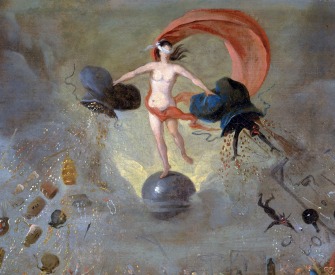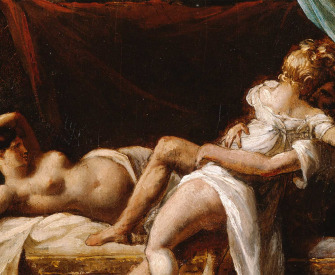Sir Ralph and his squire rode till they discovered the towers and spires of Nottingham, where the knight introduced himself to the sheriff, and demanded an armed force to assist in the apprehension of the outlawed Earl of Huntingdon. The sheriff, who was willing to have his share of the prize, determined to accompany the knight in person, and regaled him and his man with good store of the best; after which, they left with a stout retinue of fifty men.
“God’s my life,” said the sheriff, as they rode along, “I much doubt if this outlawed earl, this forester Robin, be not the man they call Robin Hood, who has quartered himself in Sherwood Forest, and whom in endeavoring to apprehend I have fallen diverse times into disasters. He has gotten together a band of disinherited prodigals, outlawed debtors, excommunicated heretics, elder sons that have spent all they had, and younger sons that never had anything to spend; and with these he kills the king’s deer, and plunders wealthy travelers of five-sixths of their money; but if they be abbots or bishops, them he despoils utterly.”
The sheriff then proceeded to relate to his companion the adventure of the abbot of Doubleflask: how the abbot, returning to his abbey in company with his high cellarer, who carried in his portmanteau the rents of the abbey lands, and with a numerous train of attendants, came upon four seeming peasants, who were roasting the king’s venison by the king’s highway; how, in just indignation at this flagrant infringement of the forest laws, he asked them what they meant, and they answered that they meant to dine; how he ordered them to be seized and bound, and led captive to Nottingham, that they might know wild flesh to have been destined by providence for licensed and privileged appetites, and not for the base hunger of unqualified knaves; how they prayed for mercy, and how the abbot swore by St. Charity that he would show them none; how one of them thereupon drew a bugle horn from under his smock-frock and blew three blasts, on which the abbot and his train were instantly surrounded by sixty bowmen in green; how they tied him to a tree, and made him say mass for their sins; how they unbound him, and sat him down with them to dinner, and gave him venison and wild fowl and wine, and made him pay for his fare all the money in his high cellarer’s portmanteau, and enforced him to sleep all night under a tree in his cloak, and to leave the cloak behind him in the morning; how the abbot, light in pocket and heavy in heart, raised the country upon Robin Hood, for so he had heard the chief forester called by his men, and hunted him into an old woman’s cottage; how Robin changed dresses with the old woman, and how the abbot rode in great triumph into Nottingham, having in custody an old woman in a green doublet and breeches; how the old woman discovered herself; how the merry men of Nottingham laughed at the abbot; how the abbot railed at the old woman, and how the old woman outrailed the abbot, telling him that Robin had given her food and fire through the winter, which no abbot would ever do, but would rather take it from her for what he called the good of the church, by which he meant his own laziness and gluttony; and that she knew a true man from a false thief, and a free forester from a greedy abbot.
“Thus you see,” added the sheriff, “how this villain perverts the deluded people by making them believe that those who tithe and toll upon them for their spiritual and temporal benefit are not their best friends and fatherly guardians; for he holds that in giving to boors and old women what he takes from priests and peers, he does but restore to the former what the latter had taken from them; and this the impudent varlet calls distributive justice. Judge now if any loyal subject can be safe in such neighborhood.”
From Maid Marian. Peacock was already known for his satirical novels such as Headlong Hall and Nightmare Abbey when he wrote to his friend Percy Bysshe Shelley in 1818 about Maid Marian, claiming it would be “the vehicle for much oblique satire on the oppressions that are done under the sun.” An operatic adaptation of the novel was a critical success in London and ran for fourteen months; an American production closed after one night in New York City.
Back to Issue



